- Home
- John Bellairs
The Face in the Frost
The Face in the Frost Read online
The Face in the Frost
John Bellairs
The Face in the Frost is a fantasy classic, defying categorization with its richly imaginative story of two separate kingdoms of wizards, stymied by a power that is beyond their control. A tall, skinny misfit of a wizard named Prospero lives in the Southern Kingdom a patchwork of feuding duchies and small manors, all loosely loyal to one figurehead king. Both he and an improbable adventurer named Roger Bacon look in mirrors to see different times and places, which greatly affects their personalities and mannerisms and leads them into a myriad of situations that are sometimes frightening and often hilarious. Hailed by critics as an extraordinary work, combining the thrills of a horror novel with the inventiveness of fantasy, The Face in the Frost is the debut novel that launched John Bellairs' reputation as one of the most individual voices in young adult fiction.
John Bellairs
The Face in the Frost
Prologue
Prologue
Рrospero and Roger Bacon, the two main characters in a story that seems crammed with wizards, were wizards. They knew seven different runic alphabets, could sing the Dies Irae all the way through to the end, and knew what a Hand of Glory was. Though they could not make the moon eclipse, they could do some very striking lightning effects and make it look as though it might rain if you waited long enough.
The two large domains mentioned in this tale were always known simply as the North Kingdom and the South Kingdom. No attempt was ever made to unite them, and the Brown River always remained the boundary. Even the maintenance and garrisoning of the two great circular forts at the mouth of the river had to be split rigidly between the kingdoms-Northerners guarded the northern fort, Southerners the southern one-though the forts had only one purpose-to keep out invaders from across the sea.
The North Kingdom was split, very early in its history, into seven lesser kingdoms, whose kings met once a year on the Feasting Hill, which was in the center of a small, roughly circular plot of ground that touched all their borders, though it did not belong to any one ruler. At this harvest festival, the High King was elected: he was usually one of the seven kings, but this was not necessary,– his term was one year, and could be extended in case of war He was given a standing army of ten thousand horsemen, but he would have been powerless without the consent of the heptarchs, as the seven lesser kings were known, since any two of them could field an army greater than his. Besides, the High King was forced to leave his own domain in the hands of a temporary ruler (usually his chief steward, who became for the time a heptarch) and reign at the beautiful, but defenseless, palace on the Feasting Hill. His army was solely for use in defending the borders and-rarely-for waging war against a rebellious Northern king. In the latter case, a council of war would be called and the kings would decide whether the situation was grave enough to require action against one of their own number. Civil war was rare, but when it did come the devastation was so great that it took generations for the North to recover.
The history of the South Kingdom was stranger and much more chaotic, if you looked at a map of the South made in Prospero's time, you would think it was a badly done and rather fussy abstract painting, or the palette of a demented artist. You would see blotches within splotches within wavy circles,-you would see shapes like lady fingers, like stars, like dumbbells, and like creeping dry rot. All this was the fault of Godwin I (Longbeard), the first King of All the South, and the last to hold any real power.
He divided up the kingdom among his sons, and they did likewise, and so on. Primogeniture was never established, so eventually the South became an indescribable conglomeration of duchies, earldoms, free cities, minor kingdoms, independent bishoprics, and counties. These little worlds were often the size of small farms, though they might be named the Grand Union of the Five Counties, or the Duchy of Irontree-Dragonrock. Each of these petty potentates coined his own money and levied troops, – all were vaguely obligated to the King of All the South, a powerless ruler who got the title by beating all opponents at the annual tournament held in Roundcourt, the chief city of the South. Seldom could a chieftain gather enough support for anything the size of a civil war, but there was constant feuding, bickering, and bullying.
Prospero lived in the South Kingdom and never, as far as I know, held public office. He stayed at home a great deal, and his trips to other places in the North and South were made on odd occasions and (sometimes) by still odder modes of travel. The route might be wildly irregular, because he wanted to see friends or visit curious things, like plague fountains, or rocks that made funny noises in the wind. This accounts for the fact that he knew more about some places far up north than he knew about places ten miles from his home. Roger Bacon, who spent most of his time in England, was more familiar with the border country between the North and the South than Prospero was. Both of them had used mirrors to visit or look at other times and places,– this naturally affected their speech, their mannerisms, and (God knows) the character of Prospero's house.
1
1
Several centuries (or so) ago, in a country whose name doesn't matter, there was a tall, skinny, straggly-bearded old wizard named Prospero, and not the one you are thinking of, either. He lived in a huge, ridiculous, doodad-coveted, trash-filled two-story horror of a house that stumbled, staggered, and dribbled right up to the edge of a great shadowy forest of elms and oaks and maples. It was a house whose gutter spouts were worked into the shape of whistling sphinxes and screaming bearded faces; a house whose white wooden porch was decorated with carved bears, monkeys, toads, and fat women in togas holding sheaves of grain; a house whose steep gray-slate roof was capped with a glass-enclosed, twisty-copper-columned observatory. On the artichoke dome was a weather vane shaped like a dancing of the observatory was a weather vane shaped like a dancing hippopotamus,– as the wind changed, it blew through the nostrils of the hippo's hollow head, making a whiny snarfling sound that fortunately could not be heard unless you f were up on the roof fixing slates.
Inside the house were such things as trouble antique dealers' dreams: a brass St. Bernard with a clock in its side, and a red tongue that went in and out with the ticks as the tail wagged; a five-foot iron statue of a tastefully draped lady playing a violin (the statue was labeled "Inspiration"), mahogany chests covered with leering cherub faces and tiger mouths that bit you if you put your finger in the wrong place; a cherrywood bedstead with a bassoon carved into one of the fat head posts, so that it could be played as you lay in bed and meditated,– and much more junk and deep closets crammed with things that peered out of the darkness off the edges of shelves, frightening the wits out of the wizard as he poked around looking for jars of mandrake root or dwarf hair in aspic. In the long, high living room-heated by a wide-mouthed green-stone fireplace-were the usual paraphernalia of a practicing wizard: alembics, spiraling copper coils, alcohol lamps-all burping, sputtering, and glurping as red, blue, purple, and green liquids boiled, dripped, or just slurched uncertainly in their containers. On a shelf over the experiment table was the inevitable skull, which the wizard put there to remind him of death, though it usually reminded him that he needed to go to the dentist. One wall of the room was lined with bookshelves, and on them you could find titles such as Six Centuries of English Spells, Nameless Horrors and What to Do About Them, An Answer for Night-Hags, and, of course, the dreaded Krankenhammer of Stefan Schimpf, the mad cobbler of Mainz.
The four long casement windows on the east wall of the living room opened onto Prospero's forest-bordered garden, an unpruned tangle of forsythia, rose, and lilac bushes split up by a few matted green paths. In the middle of the garden was a small clearing with stone benches and wicker lawn chairs; this park had a fount
ain, in the center of which a potbellied marble satyr stared mindlessly into an empty cup, as water gushed out of his ears. On summer mornings, Prospero would often sit in this weedy jungle, memorizing spells and watching the birds as they circled in confusion around the gables, pinnacles, and gargoyles that stared out in all directions from his improbable home.
But, on a hot, oppressive morning one August, Prospero stayed in bed till almost noon. He was not playing the bassoon, but he was thinking, lying there on his back with his hands folded on his chest. Finally, with an effort, he got up and went to the window, opened it, and stood looking down at the ground for quite some time. With a little shrug, he turned away, and was poking around in a bureau drawer when a voice snapped at him:
"Do you think the roof will fall in on us today? Did the frost hurt your stinkweed?"
That was the magic mirror, a competent, but somewhat sarcastic mirror in a heavy gilt frame When the magician was not trying to get something out of it, it was given to tuneless humming and crabby remarks.
"I don't know what you're talking about," growled Prospero as he hunted for his toothbrush.
"You know very well what I mean' said the mirror in an unpleasant tone. "What's all this staring at the ceiling and thinking? Have you discovered a cure for mangy eyebrows?"
"I may discover a cure for talkative pieces of plate glass," said the wizard, grinding his teeth.
"Boorish threats," said the mirror. "By the way, if you step over here now, you can view Aurungabad, as seen from the ruins of the palace of Aurungzebe."
"How nice," muttered Prospero, and he disappeared into the bathroom with a balding toothbrush clenched in his fist.
A little later, as Prospero was soaking in a large porcelain tub with eagle-claw legs, the mirror began to sing:
"O-over-head the moon is SCREEEEAMING,
Whi-ite as turnips on the Rhine..."
Most of the time, the mirror's singing voice might have been compared with that of a tubercular reed organ; but, when it hit high notes, Prospero thought of children with long nails scraping on blackboards. So, it was not surprising that the wizard soon emerged from the bathroom, wet and dripping and wrapped in a yellow-damask towel that looked like a Byzantine cope.
"All right," he said quietly. "Let's see what we can see."
The wizard peered deep into the fathomless depths of the murky mirror, and when the swirling mists cleared, he found himself watching a 1943 game between the Chicago Cubs and the New York Giants. The Cubs were behind 16-00 in the eighth inning.
Prospero stood silently watching for a few seconds. Then, with an evil grin, he produced from behind his back a large cake of soap. "Now watch it, whiskers," said the mirror, alarmed. "Don't you dare...Ak Hoog! Glph...Hphfmnphpph!"
Prospero scribbled wildly on the mirror with the cake of soap, signed his name with a flourish, and went downstairs, chuckling.
But, not even his victory over the cranky mirror could help Prospero to shake off the uncertain fear that hung in the still, heavy air of that August day. Something was coming, and he would have given his hat to know what it was. In the meantime, he fribbled away the day with mindless tasks like cleaning the ash pit of the fireplace and raising the ghosts of flowers. From a square bottle marked "Essential Salts," Prospero poured a few green crystals into a white ceramic dish; when he had mumbled some words over the bowl, a pink and green cloud began to ascend from the shimmering translucent pebbles. Before long, a definite shape appeared.
"Carnations," said the wizard disgustedly. "Phooey."
He fanned at the uninteresting specter until it blew out the window in a long sickly streamer of colored smoke. Then, with a distracted air, he walked to a carved lectern that held a large, unlabeled folio volume. It was a thick, dog-eared brown leather cover and its blue-ruled book in a cracked brown leather cover and its blue-ruled pages were filled with the wizards florid script; on some pages were pentacles, pentagrams, and doodles, these latter being usually pictures of bearded patriarchs, pharaohs, and King Louis XI of France, who, as far as Prospero was concerned, looked like Cyrano de Bergerac with a lumpy Roman nose.
On some pages were spells set to music: the curious words, split up into syllables, wandered through bars of badly drawn square notes. He selected one of these incantations and began to chant in a loud, wailing voice. All the clocks in the house suddenly went off at once, though it was only three-twenty; the copper pots hanging in the kitchen clanged and whanged against each other,– and a couple of the wizards books fell off their shelves with a clump. But, nothing else happened. Prospero slammed the magic book shut and slumped into an overstuffed chair. He fumbled in his smoking stand for his pipe and tobacco.
"I learned that spell fifty years ago," he mumbled as he lit his pipe. "And, I still don't know what it's for."
Around six o'clock, a dark greenish storm-twilight descended, though the sun was not due to set for two hours. Prospero got up and walked out the back door into this unnatural dusk,– in the yard behind the house, no birds could be seen or heard,– the leaves of the trees hung like carved ornaments,-and even the splashing of the fountain was strangely muted. The slates of the roof were a flat gray, and the thick-piled clouds seemed to press down on the turreted house. Prospero went back inside and decided to prepare dinner for himself. He pottered about in the kitchen in an attempt at a cheerful manner, whistling bits of tunes like "Lilliburlero" and The Piper of Dundee." But, his whistling died away as he suddenly thought, with inexplicable dread, that he would have to go down into the cellar for a pitcher of ale. Now, a grown man-especially one who is a wizard-is not supposed to be afraid of going to the cellar at night. But, though he loved the strong brown ale that aged in oozing vats in his dark cool basement, Prospero would (this time) have just as soon done without.
"This is silly." he said to himself. "You are a coward and a lumphead." He lit a tall, twisty beeswax candle and grabbed a fat pewter pitcher from the nail where it hung.
The cellar way was dark and musty-smelling, and a damp breeze blew from a window that must have been left open. Prospero, moving along cautiously in the wavering yellow light, passed shelves of cobwebbed jelly jars and dusty overturned steins with inscriptions in strange blue letters. Overhead were the floor beams of the house, split logs with the furrowed black bark still on them. When he reached the great rounded shapes of the beer kegs, Prospero stuck the candle into a wooden wall socket and turned toward a heavy brassbound tan labeled "XXX Strong Ale." Setting the pitcher on a shelf just under the blocky wooden spigot, he turned the handle, and the ale gushed into the container with a tinny rising sound.
He looked absently around the cellar as he waited for the pitcher to fill, and suddenly, his eye was caught by the fluttering of an old cloak hanging on a wooden peg. And, in that instant, Prospero got the odd notion that the cloak was not his, and might not be a cloak at all. He stared intently at it as the fluttering of the garment became more agitated. And then, it turned to meet him. With empty flapping arms, it floated across the cellar floor, swaying in a sickening nightmare rhythm. Prospero clenched his fist and felt his pulse beating in his palms; he fought the rising fear as the cloak flapped nearer, for with all his heart, he did not want it close to him. As it closed the gap between them, all the spells against apparitions ran through his mind, but he had the queasy feeling that none of them would work. The thing was about six feet from him, its cold musty-cellar breath faintly brushing his face, when it simply stopped. The flapping arm dropped, and the gray cloak, or whatever it was, slumped into a ragged heap on the stone floor. Prospero stepped back nervously and stiffened as he felt a cold sensation. But, when he looked down, he laughed abruptly, since he had stepped into the spreading brown pool of ale that was now sloshing and frothing over the sides of the pitcher. He shut off the spigot and leaned, trembling, against the barrel, his forehead pressing the fragrant wet wood. When he looked again at the place on the floor where the cloak had fallen, he was not surprised to see that there w
as nothing lying on the rough candle lit stone. The peg where the cloak had first hung was not there either.
As soon as he felt able to walk, Prospero grabbed up the brimming pitcher, snatched the candle from its sconce, and dashed up the creaking wooden stairs. When he got back to the kitchen, he felt better, and, since ghostly cloaks should be common experience for a sorcerer, he felt a little ashamed. But, when he closed his eyes, the scene in the cellar came back with all its inexplicable terror.
"Well," said Prospero to himself, "the thing to do is to keep my eyes open and eat my dinner."
Which he did, though he had hardly gotten halfway through his meal of cold roast beef, ale, and Cheshire cheese when the heavy hanging storm broke over the house with a long, splitting, plate-rattling crash. The thunder did not frighten Prospero half so much as his reaction to it, which was to shove his chair back and look quickly over his shoulder. For the next hour, he was plagued by the strong, palpable feeling that someone was behind him. Even in his study, where he had pushed his big wing chair up against the paneled wall, he found that he could not read-the shadows that leaned out over the high-sided chair seemed more than shadows. He got up and went back to the kitchen, where he nervously finished his dinner as the rain swished and rattled at the diamond-paned window; he tried to play solitaire with an old oblong deck of tarot cards; and he finally settled in his wing chair again to read by the light of a squat, ruby-shaded oil lamp.
By nine o'clock, the storm had passed over and crickets were chirping in the wet grass outside. Prospero found himself still edgy, and he was reading the same sentence about wood trolls for the third time when the doorbell rang. The bell was a small, tinkling silver toy with a chain pull, but just then, it sounded like a rusty iron bourdon tolling in an empty church on a winter night. Prospero let the heavy volume he was holding slip to the floor with a loud dust-raising whump. He stared for several minutes at the half-open study door that led to the dark front hall. Finally, with a sudden resolute jerk, he stood up, crossed the room, and peered into the narrow vestibule. The linen-curtained square window in the front door threw a wavering yellow patch on the splintered floorboards, and the huddled shapes of picture frames, dressers, and coat trees leaned out from the walls. Staring intently at the blank yellow window, Prospero stepped into the hall and lurched into a massive mahogany coat tree. The tall spindled thing rocked on its warped base, and three or four umbrellas fell in the wizard's path with a swishing clatter. Shaken, but still relatively calm, he stepped over the scattered junk and got to the door, grasped the cold porcelain knob, and pulled. The swollen black door would not open at his first jerk, or at the second. On the third try, it rattled suddenly inward and the chilly night air, smelling of cut grass and rain-drenched lilacs, blew gently into the hall. From the blistered white porch ceiling hung a square yellow-palled lantern, and around it mosquitoes, moths, and other night insects flittered and ticked. The tiny doorbell was still trembling on its rusty hook. No one was there.

 The Curse of the Blue Figurine
The Curse of the Blue Figurine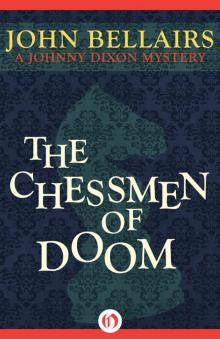 Chessmen of Doom
Chessmen of Doom Secret of the Underground Room
Secret of the Underground Room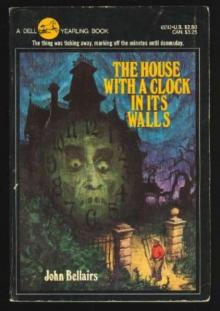 The House With a Clock in Its Walls
The House With a Clock in Its Walls The Vengeance of the Witch-Finder
The Vengeance of the Witch-Finder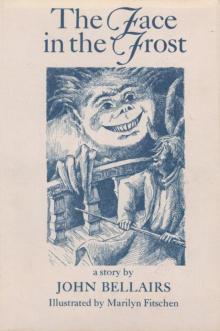 The Face in the Frost
The Face in the Frost Revenge of the Wizard's Ghost
Revenge of the Wizard's Ghost Spell of the Sorcerer's Skull
Spell of the Sorcerer's Skull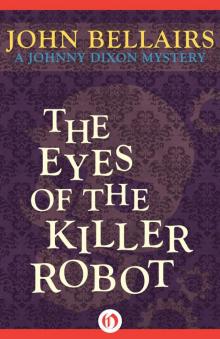 Eyes of the Killer Robot
Eyes of the Killer Robot Mummy, the Will, and the Crypt
Mummy, the Will, and the Crypt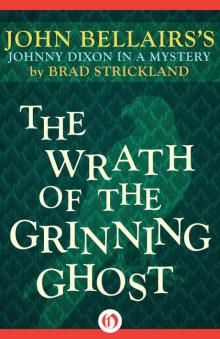 Wrath of the Grinning Ghost
Wrath of the Grinning Ghost The Mansion in the Mist
The Mansion in the Mist The Doom of the Haunted Opera
The Doom of the Haunted Opera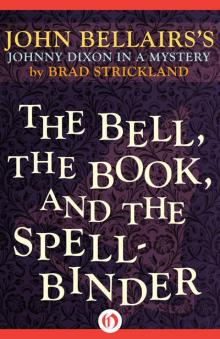 The Bell, the Book, and the Spellbinder
The Bell, the Book, and the Spellbinder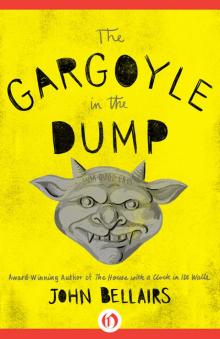 The Gargoyle in the Dump
The Gargoyle in the Dump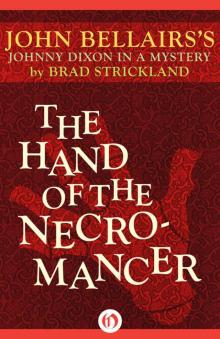 The Hand of the Necromancer
The Hand of the Necromancer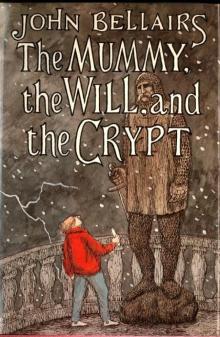 The Mummy, the Will, and the Crypt
The Mummy, the Will, and the Crypt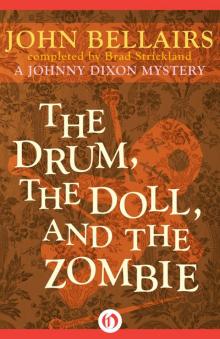 Drum, the Doll, and the Zombie
Drum, the Doll, and the Zombie The Specter from the Magician's Museum
The Specter from the Magician's Museum The Letter, the Witch, and the Ring
The Letter, the Witch, and the Ring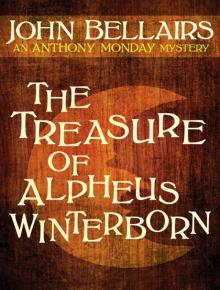 The Treasure of Alpheus Winterborn
The Treasure of Alpheus Winterborn The Dark Secret of Weatherend
The Dark Secret of Weatherend The Figure in the Shadows
The Figure in the Shadows